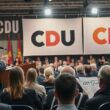German Union Leader Warns of Possible Strikes Ahead of Federal Election
The head of Germany’s largest trade union, the Verdi, has warned that strikes could become more frequent in the coming weeks, ahead of the federal election. “We are capable of conducting a successful strike” said Verdi chief Frank Werneke in an interview with the Süddeutsche Zeitung, citing the high motivation of workers to stand up for their demands. Werneke is leading the wage negotiations for 2.5 million public sector workers, including teachers, waste management workers, and caregivers, which are set to begin next week.
The union chief emphasized that it was now up to the employers to decide if a strike was necessary, urging them to present a good offer by the second round of negotiations, scheduled for February 17 and 18, just five days before the federal election. Werneke, however, assured that the union would not disrupt the election itself, stating that they would take measures to ensure a peaceful and orderly voting process.
While a large-scale strike like the one in 2019, which brought many public services to a standstill, is not ruled out, Werneke said the outcome would depend on the course of the negotiations. The union has a strong interest in the transportation sector, where workers are dissatisfied, and Werneke described the situation as “boiling over.”
In a separate issue, Werneke criticized the plans of the Union and the Free Democratic Party (FDP) to maintain the current debt brake, calling it “madness, at least in its current form.” He argued that the economy was not growing, and the investment backlog at the federal and state levels was developing into a location risk.
The union leader also expressed skepticism about the tax relief plans of the Union, estimating that around 60% of the planned relief would benefit the top 10% of the population, while the government would need to make cuts to the basic allowance (Bürgergeld) to finance the measures. Werneke described this as “unsocial and constitutionally questionable” and a form of “irresponsible populism.”
In a positive note, Werneke welcomed the proposal of the Green party’s candidate, Robert Habeck, to make capital gains subject to social security contributions and use the revenue to finance the health insurance system. He praised the idea, saying that the statutory health insurance and long-term care insurance needed more financial sources than just the income of the working population, and that the simple workers would otherwise be burdened even more.
Regarding the federal election, Werneke explicitly called on the union’s members not to vote for the Alternative for Germany (AfD), describing the party’s efforts to make xenophobia socially acceptable as being in fundamental opposition to the union’s values. He also criticized the AfD’s ideas, such as a possible exit of Germany from the European Union, as being worker-unfriendly.





